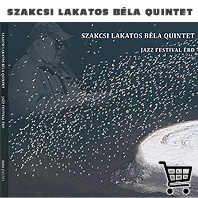
The keynote speaker, Krin Gabbard (Columbia University) is going to analyse the contemporary representation of jazz based on recent films and books. Prof. Gabbard is one of the founding fathers of the new direction in research called jazz studies, undertaking to examine various and complex aspects of jazz and the arts, society, etc.
Much-in-demand saxophone soloist János Ávéd looks into issues of improvisation. He asks what use could the principle of dodecaphony, e.g. sounding all twelve notes in succession be when the musician is improvising. Researcher of the Schiller University Martin Breternitz is focusing on what structures, networks and potentials are available to the German jazz musician, how German jazz life is perceived by the musicians themselves. Senior Scientist of the Graz Jazz Research Institute Márton Szegedi has written a book on the music of Gábor Szabó, the American-Hungarian guitarist who became world-famous in the sixties. Based on the book published last year, Szegedi explores the different cultural and musical influences that contributed to the individual style of Szabó.
The closing roundtable discussion invites a musicologist, a historian, and a film archivist to help answer the question of the title based on their own experience: ‘Does Hungarian jazz constitute cultural heritage? If yes, how should we preserve it?’
The Jazz Studies Research Group (Jatakucs by its Hungarian acronym), was founded in 2015 by jazz critic Kornél Zipernovszky in order to make jazz the subject of interdisciplinary research in Hungary, in a way jazz studies have done for many decades in the academic world. He found like-minded people easily because surprisingly many BA, MA, and PhD dissertations in various fields have dealt with jazz topics. The first thematic issue that the group published appeared in the English-language Americana E-journal online, and the second in 2017 in the journal Replika (#101-102), laying down the foundations of Hungarian jazz studies. The First International Symposium of the Jazz Studies Research Group in May 2017 physically and symbolically linked the Budapest Music Center (host to Opus Jazz Club) and the Social Science Faculty of Corvinus University, just as the Müpa Jazz Showcase has provided a great opportunity to look at both theoretical and practical issues of jazz music.
Krin Gabbard (Columbia University)
Representing Jazz in the Twenty-First Century
Jazz writers and scholars are probably too close to contemporary music to assess its broader associations. Films, novels, and television programs from the twenty-first century may be the best place to find global attitudes toward the music today. In novels such as Roddy Doyle’s Oh, Play That Thing (2004), Nathaniel Mackey’s Bass Cathedral (2007), and Michael Chabon’s Telegraph Avenue (2012), complex characters are seamlessly folded into well-established jazz histories. By contrast, in films such as The Terminal (Steven Spielberg, 2004), Tony Takitani (Jun Ichikawa, 2004), and Good Night and Good Luck (George Clooney, 2005), jazz functions primarily to promote nostalgia. More recently, in the AMC Television program, Preacher (2016-2019), jazz retains some of the strangeness and marginality it has carried at least since the middle of the twentieth century. Creative artists today encounter an extremely wide range of possibilities if they wish to put some jazz into their works.
Krin Gabbard teaches in the Jazz Studies program at Columbia University. In 2014 he retired from Stony Brook University where he had, since 1981, taught classical literature, film studies, and literary theory. His books include Psychiatry and the Cinema (1987), Representing Jazz (1995), Jammin’ at the Margins: Jazz and the American Cinema (1996), Black Magic: White Hollywood and African American Culture (2004), and Better Git It in Your Soul: An Interpretive Biography of Charles Mingus (2016).
János Ávéd (LFZE)
Dodecaphony in Jazz Imrovisation
Jazz has been defined by the duality of improvisation and composition since its birth.
Composers want to achieve the vitality of articulation in improvisation, while improvising musicians have the formal density of composition in mind. This is what makes the contemporary jazz musician research and learn the origins of different musical traditions, to be able to deploy the compositional methods and structural idioms spontaneously. How can a jazz musician remember twelve notes while formulating the music? Can dodecaphony be achieved in improvisation practice? Is there a way to improvise twelve-tone lines spontaneously? How does the study of musical structures enrich the vocabulary of a jazz musician?
János Ávéd (b. Mindszent, 1983), saxophonist, composer, arranger, teacher graduated from the Liszt Ferenc Academy of Music (LFZE). They achieved a breakthrough with his Trio Balance featuring David Binney in 2013 at the Palace Of Arts Budapest. He has undertaken to develop a new musical language of his own with his eponymous quartet, while he is one of the most sought-after sidemen on his instrument. He played with Joey Calderazzo featured in the Transform Quintet. As a soloist of the Modern Art Orchestra he worked with Benny Golson, Kurt Elling, New York Voices, Péter Eötvös, Adam Nussbaum, Bob Mintzer, David Liebman, Randy Brecker, Chris Potter, Mike Garson, Mezzoforte, Erika Miklósa, Rhoda Scott and Silje Nergaard. He started his DLA as an individual doctoral student of jazz saxophone at the LFZE in 2019.
Martin Breternitz (Schiller University)
Doing Jazz in 2020s Germany:
Structures, Networks and Self-Conceptions
Jazz culture in today’s Germany is a broad kaleidoscope of creative local and translocal musicians, scenes, clubs, festivals and universities. Still, the majority of German jazz musicians struggles to make a decent living doing jazz. In an explorative overview I ask how contemporary jazz scenes and networks in context with state subsidies are structured and how they can be described by popular musicology. On the other side stands the question of social and practical realities of a young generation of professional German jazz musicians. How and why are they doing jazz? What is, according to them, the “state” of jazz in Germany, what is to come? As a mostly educated middle-class music, jazz has seemingly lost its friction as a means to mutualize, criticize or take part in contemporary political discourses. Central aspects seem to be individuality and the expression of oneself. The intention of this paper is to give some insights into (in)formal structures, as well as self-conceptions and needs of young professional German jazz musicians as a potential basis for comparative reflections of states of jazz in other countries.
Martin Breternitz (b. 1987) studied musicology in Leipzig and Weimar (Germany), as well as jazz saxophone under various professional players. Complementary he worked in cultural administration, managing the federal youth big band of Thuringia and doing projects for the statewide jazz festival Jazzmeile. He co-founded the Thuringian association for rock, pop & jazz (LAG Songkultur). M.A. in musicology with specialization in history of jazz and popular music at Weimar Music School Franz Liszt in 2015. PhD project on jazz in the GDR since 2016 at Weimar and Friedrich-Schiller-University Jena.
Márton Szegedi (Kunstuniversität, Graz)
Stylistic Pluralism and Intercultural Influences
in the Work of Gábor Szabó
Considering the history of jazz one can observe that until the end of the sixties particular subgenres of style played a prominent role in every era and most jazz performers followed the ideals of those styles. In the middle of the sixties a new trend emerged, the globalisation of music occured. On the one hand jazz encountered elements of folk music, on the other hand it started to absorb different structures of rock and pop music thereby significantly broadening its stylistic limits. Gábor Szabó (1936–1982) is one of the few Hungarian-born jazz musicians who played a central role on the American jazz scene while contributing to the emergence of a pluralism of styles in a major way. He was one of the first jazz guitarists who incorporated ethno elements into his music, thereby laying down the foundations of transnational styles. At the same time he also made use of pop and rock music, which in turn led to the emergence of new hybrid styles. In my talk I’ll focus on what intercultural influences have most significantly contributed to the stylistic spectrum of Szabó and how they have surfaced in his guitar performances.
Márton Szegedi completed his studies in classical guitar (MA), music education (MA) and musicology (PhD) at the University of Music and Performing Arts, Graz (Kunstuni). In 2011, he started to work as a post-doctoral researcher at the Institute for Jazz Research of the same university. Since 2017 he has been working there as a senior scientist. Since 2007 he has been publishing in international journals and is currently co-editor of the publication series Jazz Research News, Jazzforschung/Jazz Research as well as Beiträge zur Jazzforschung/Studies in Jazz Research. His first book, entitled Die Stilistik von John Scofield (Graz: Adeva), was published in 2012; his second monograph on The Music of Gábor Szabó (Graz: Adeva) was issued in 2019. His main research topics are jazz analysis, transcription and stylistic research.
Roundtable Discussion
Does Hungarian jazz constitute cultural heritage?
If yes, how should we preserve it?
Participants :
Anna Dalos, music historian, Head of The Archives and Research Group for 20th-21st Century Hungarian Music at the Institute of Musicology
Péter Erdősi, assistant professor, Atelier, European Social Science and Historiography Department at the School of Humanities of Eötvös Lóránd University
Márton Kurutz, Manager of Collections and Research, Hungarian National Film Fund and Film Archive
Moderator:
Kornél Zipernovszky, jazz critic, founder of the Jazz Studies Research Group
Participants are asked the question whether jazz could be considered a part of the national cultural heritage. But not only records, radio- and TV recordings should be included in the notion. Mátyás Seiber was the head of the first jazz faculty at the Frankfurt conservatory, in the thirties the Arizona Dancing Revue became internationally famous, and Gloomy Sunday became a jazz standard. The music of the classic film The Witness was composed by György Vukán, and Béla Szakcsi Lakatos was declared an Artist of the Nation over five years ago. Kálmán Oláh improvised in the accompaniment of a symphonic orchestra in the National Concert Hall of Müpa, and Mihály Dresch had his self-constructed ethno-jazz instrument, the Fuhun patented, etc. As long as we consider these outstanding achievements as valuable artistic contributions, they are worthy of being preserved in a museum or an archive, just like artifacts of more acknowlegded or older arts and genres would be. As there are hardly any recources available for establishing a new institution, the question is: how should the existing numerous public and private archives be better utilised for the good of the general public, the researchers, the musicians and the music students, not to mention considerations of a wider international recognition?
2nd International Jazz Studies Symposium
of Müpa and the Jazz Studies Research Group
February 8th, 2020., 10. a.m.
In conjunction with the Müpa Jazz Showcase
10:00 Greetings
10:10-10:50 Keynote lecture
Prof. Krin Gabbard (Columbia University)
Representing Jazz in the Twenty-First Century
10:50-11:20 Lecture
János Ávéd (PhD student, LFZE)
Dodecaphony in Jazz Imrovisation
11:20−11:40 Intermission
11:40−12:10 Lecture
Martin Breternitz (PhD student, Schiller University, Jena)
Doing Jazz in 2020s Germany: Structures, Networks and Self-Conceptions
12:10−12:40 Lecture
Márton Szegedi, PhD (University of Music and Performing Arts, Graz)
Stylistic Pluralism and Intercultural Influences in the Work of Gábor Szabó
12:40−13:00 Intermission
13:00−14:00 Roundtable discussion
Does Hungarian jazz constitute cultural heritage? If yes, how should we preserve it?
Participants:
Anna Dalos, music historian, Head of The Archives and Research Group for 20th-21st Century Hungarian Music at the Institute of Musicology
Péter Erdősi, assistant professor, Atelier, European Social Science and Historiography Department, Eötvös Lóránd University
Márton Kurutz, Manager of Collections and Research, Hungarian National Film Fund and Film Archive
Moderator:
Kornél Zipernovszky, jazz critic, founder of the Jazz Studies Research Group
The MC of the symposium is Zsuzsanna Könyves-Tóth, member of the Jazz Studies Research Group, PhD student of the Liszt Academy. Proceedings are in English and Hungarian, simultaneous translation is available. Entrance is free of charge, but please, register for the event at the e-mail adddress: Ez az e-mail-cím a szpemrobotok elleni védelem alatt áll. Megtekintéséhez engedélyeznie kell a JavaScript használatát.













